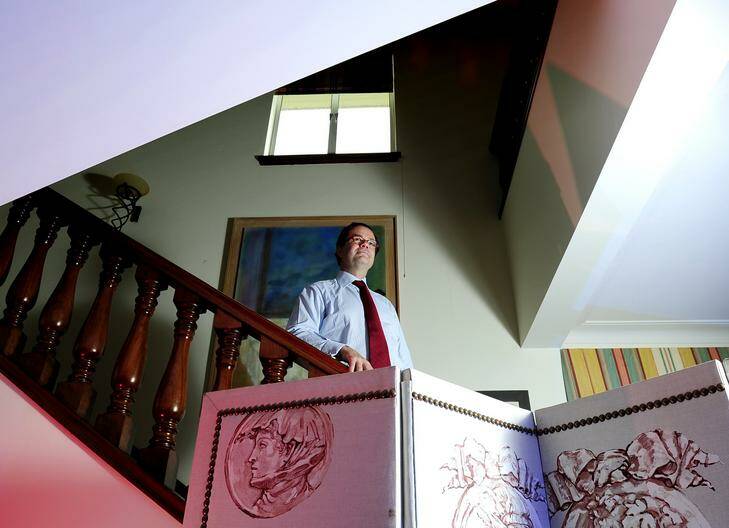IT STARTED calmly enough, with throw cushions of all things. They started popping up in homewares stores all around the place, saying excitingly: ''Paris'', in bold, alluring font. I wanted one, but I felt like a fraud. I hadn't been there yet.
Subscribe now for unlimited access.
or signup to continue reading
So I resisted. Then came the compact mirrors with painted pictures of the Eiffel Tower, miniature works of art for your handbag. The battle of resistance became harder. Soon, glamorous looking books about French cooking, decorating and overall style began infiltrating fashion stores, sitting temptingly on shelves between the latest season's dresses. Titillating accessories for a fashionable life.

By the time the Eiffel Tower bookends made an appearance in shops I knew my resolve had gone, melted away like so many beautiful macaroons served with coffee in the afternoon.
I relented and went to Paris while on honeymoon, returning home with my very own miniature Eiffel Tower, encrusted with pink crystals.
Australia, it seemed, had struck up a love affair with French culture and I was joining in.
On the home front, the importation of French culture had gone well beyond brioche being treated as a staple in so many local delis.
''The French have a phrase for it - ca bouge, which roughly translated means things are happening,'' explains author Janelle McCulloch, in her book La Vie Parisienne.
''And indeed they are. In fact, Paris is so damn sexy now you almost need Jackie O-style sunglasses just to walk out of the Gare du Nord station.''
But the love affair goes far deeper, explains French Ambassador to Australia Stephane Romatet. It is being requited by France.
The Musée National Picasso Paris has lent an exhibition of Pablo Picasso's personal art collection, for the first time allowing it outside of Europe, to Brisbane's Gallery of Modern Art. Before you ask, Romatet says there is a point to be made clear: Picasso was French, in spite of what you may have heard about his being born in Spain. ''He spent his life in the south of France, he died in France, he was very much engaged in the political life of France,'' Romatet says.
The appreciation for fine art is also a two-way street, Romatet explains, as Aboriginal art work has garnered strong support in France. ''In France there is more and more interest in the Australian way of life,'' he says.
Romatet said Paris had emerged as the top destination for Aboriginal artworks within international markets and it was on show, among other places, at the Quai Branly Museum, located near the Eiffel Tower. But the links go back further. Australia's presence was also evident in the reminders of shared wartime history, such as the Australian War Memorial at Villers-Bretonneux.
''The liberation of France in the Second World War was, I think, a huge event for the creation of the Australian national identity,'' Romatet said.
''In a sense I think you can say that part of the Australian identity took its roots on the fields in France. And that creates immediately a very strong connection for Anzac Day in France and these memorials in the countryside of France.
''It creates a very strong link of remembrance of a common history and it is a very strong element in the connection (between France and Australia) because it comes from the people.''
Romatet says France is preparing to commemorate, in 2014, a century since World War 1. ''A major event between France and Australia,'' Romatet said.
The travel between the two nations, though now very different, has also emerged as a strong link, with many French people choosing to visit Australia.
''Australia is seen by many French people as a destination to go, it is very popular place for tourism,'' Romatet says. ''And I am happy to see more and more Australians go there.''
Indeed, McCulloch says Paris has, in the past 10 years, become what London was in the early 1990s: The Destination for Aussies. ''We all sort of went off to London for two years, it was like a tour of duty,'' she explained.
''London now is not the same city it was. It was going through its 'cool Britannia' phase. It was 'hip' and cool and all the adjectives that are now passe.
''London started having a lot of troubles both economically and socially.
''Paris started to overtake London in the style stakes and the glamour scene and Paris became the place to live and have an apartment and then write an ex-pat book about.''
It is something McCulloch became well versed at - she now has three titles about France under her belt, the latest titled Paris: A Guide to the City's Creative Heart.
When it comes to literature, the French are also doing their bit to help foreigners add some Parisian culture to their lives, even if they cannot make a trip to Europe. There is advice on how to achieve the classic French figure, in the popular and well known book French Women Don't Get Fat. And indeed the French secrets on how to raise a well mannered child have also been shared, albeit by American author Pamela Druckerman, in her book French Children Don't Throw Food: Parenting Secrets From Paris.
There are a lot of revealing insights, including: don't let your children graze at will through the kitchen refrigerator, don't entertain children's menus unless you want offspring who refuse to eat anything except chicken nuggets.
It seems so sensible, it's a wonder we didn't come up with it on our own.

